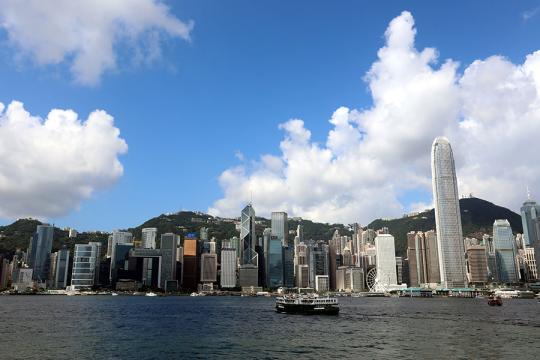
A panoramic view of the financial area in Hong Kong. (Photo/Xinhua)
Hong Kong's political leaders urged the special administrative region government on Tuesday to put national security law legislation on the agenda, in order to end such conduct for the sake of Hong Kong's future prospects.
In remarks ahead of the fifth National Security Education Day, which is marked today, they stressed maintaining national security is also the SAR's constitutional obligation, and in line with Hong Kong people's fundamental interests.
David Wong Yau-kar, a member of the city's Basic Law Promotion Steering Committee, said last year's social unrest has imposed threats to national security as some radical protesters have asked foreign forces to intervene in the SAR's affairs - an attempt viewed as interfering in China's internal affairs.
If the nation's sovereignty and territorial integrity were to be jeopardized, Hong Kong could not maintain its long-term stability and prosperity, Wong cautioned.
Given that reality, he urged the authority to enact Article 23 of the Basic Law, Hong Kong's constitutional document, as soon as possible to plug the legal loopholes in safeguarding national security.
To raise local people's awareness in this area, Wong suggested the government strengthen education about the Basic Law, which clearly stipulates the SAR's obligation to protect national security.
"Hong Kong is by no means exempt from its duty to safeguard national safety as any other place in China does," said former lawmaker Tam Yiu-chung, a member of the Standing Committee of the National People's Congress, China's top legislature.
Article 40 of the nation's security law, which is effective from 2015, also stipulates that the Hong Kong SAR and Macao SAR are obliged to fulfill their duties in safeguarding national security.
As required in Article 23 of the Basic Law, Hong Kong shall enact laws on its own to prohibit any act of treason, secession, sedition, subversion or theft of state secrets, to prohibit foreign political organizations or bodies from conducting political activities in Hong Kong, and to prohibit local political groups from establishing ties with foreign political groups.
The Macao SAR enacted its national security law in 2009. In 2003, Hong Kong government submitted a related bill to the city's Legislative Council, but later withdrew it. Since then, national security legislation in the city has been on hold.
Tam said some local political groups purposely misinterpreted the security law legislation as a deprivation of individual rights and freedom. Tam said he hopes they can end such conduct for the good of the city's prospects.
Maria Tam Wai-chu, a member of the Basic Law Committee under the NPCSC, said the city has seen "dangerous signals" in recent years challenging "one country". They include ousted lawmakers expressing separatism advocacy when taking their oath of office; the founding of lawmakers advocating separatism; and foreign organizations and individuals publicly supporting the groups' activities.
She stressed that no force can change the fact that Hong Kong will continue to develop under the framework of "one country, two systems". Enacting the national security law in Hong Kong could effectively safeguard national security and territory integrity, she added.

- Media center for 20th CPC national congress to open on Oct. 12
- China sees 422 million domestic trips during National Day holiday
- Xi pays tribute to national heroes on Martyrs’ Day
- Xi to attend Martyrs’ Day event, present flowers to fallen national heroes
- A look at how delegates to upcoming 20th CPC national congress were elected
- Flower displays decorate Chang’an Avenue for National Day in Beijing
Popular Videos
Hot comments
- First apes at U.S. zoo receive COVID-19 vaccine made for animals, zoo official says
- China Life: Chinese women shine with She Power
- Foreign firms approved to offer VPN services in capital
- Homemade curling videos trending in China
- 86-year-old grandma in Hebei spends most her life on traditional cheongsam
- Winners of 2022 Inaugural WLA Prize announced
- Lantern Festival: A romantic celebration in China
- Two Chinese COVID-19 vaccine firms to supply vaccines to COVAX
- Media center for 20th CPC national congress to open on Oct. 12
- Six suspects arrested in HK for role in SE Asia job scam
Top Reviews
- Young artists recreate beauty of traditional Hanfu costume
- China releases photos of tallest tree
- English version of ‘Understanding Xi Jinping’s Educational Philosophy’ published
- China crowned in men’s team for 10th straight time at table tennis worlds
- China publishes Atlas of Wildlife in SW China
- Guangxi’s 10 Years: A Visit to China’s Qinzhou Port
- Congress delegate helped lift village out of poverty
- Expo highlights joint efforts in NEV development
- Racism stain of shame on ‘world democratic paradise’
- U.S. may face new COVID wave this upcoming winter: report







